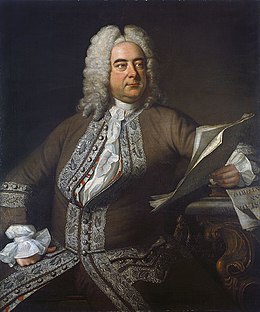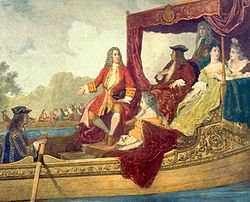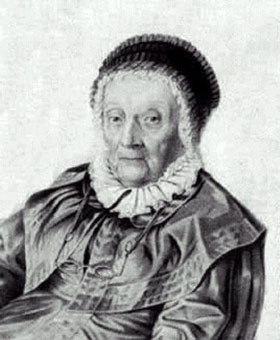Yesterday, it was the 326th anniversary of the birth of George Frideric Handel and today is the 300th anniversary of the first performance of Rinaldo, an opera he composed which also happened to be the first Italian opera written for the London stage. I think the universe is hinting to me that it is time I wrote about Handel (which, handily, is code for "I really like lists").
10 Facts About George Frederic Handel:
1) When he was born, Handel's father was already 63, and had high hopes for his son. He envisaged a career in law for the boy, but it soon became apparent that he had an enormous talent for music - and not only this, but he enjoyed spending hours playing instruments. Georg Handel Sr. was so alarmed by this development that he strictly forbade his son from going near any musical instrument, but Handel Jr. was having none of this. He somehow found a way to sneak a clavichord (a kind of early keyboard) into an attic room at the top of his house, and he would creep up there at night when everyone had gone to bed, to teach himself how to play.
 2) During Handel's early teens, he took a trip with his father to go and visit his half-brother Carl, who at the time was a valet to Duke Johann Adolf I. Legend has it that whilst he was there, the Duke overheard him playing on the church organ, and was delighted by what he heard. This helped Handel to convince his father that he should be allowed lessons in composition and keyboard technique, and so he studied under Friedrich Wilhelm Zachow. During this time, he played for Frederick I of Prussia, and met many contemporary composers, including Bononcini and Telemann.
2) During Handel's early teens, he took a trip with his father to go and visit his half-brother Carl, who at the time was a valet to Duke Johann Adolf I. Legend has it that whilst he was there, the Duke overheard him playing on the church organ, and was delighted by what he heard. This helped Handel to convince his father that he should be allowed lessons in composition and keyboard technique, and so he studied under Friedrich Wilhelm Zachow. During this time, he played for Frederick I of Prussia, and met many contemporary composers, including Bononcini and Telemann.3) In 1702, Handel went to the University of Halle to study Law as his father had wished, but did not enjoy it. After only a year, he dropped out and became instead a violinist at the Hamburg Opera House. Between 1705 and 1708, he wrote and possibly directed four operas which were performed there.
4) Handel met a member of the famous de' Medici family around 1706, and accepted their invitation to spend some time living in Rome with them. At the time, operatic music was banned by the Papal States, so instead he composed choral music for the church for performances in the city. He continued, however, to write operas which were performed elsewhere in Europe, including Agrippina, which had a then unprecedented run of 27 performances, and was the object of much critical acclaim.
5) In 1710, Handel became Kapellmeister to the man who was soon to become King George I of England, and so moved to London when George did, in 1714. A Kapellmeister was a man who was in charge of music-making, and so Handel's role for the rest of his life was to compose as much music as possible, something he did to great aplomb.In July 1717, the Water Music was performed for the first time along the Thames, where it went down a storm. At around this point also, Handel decided that he was bored of composing operas, and ignored them entirely for about five years.
6) Fiscally, Handel was very lucky - he invested in the famous South Sea Company in 1716, but managed to sell his stocks in 1720, before the bubble burst, leaving him a very rich man. During his lifetime, he was heavily involved with charities, and gave much money to the Foundling Hospital in London, as well as to charities which helped impoverished musicians and their families.
7) His time in Britain can be split into three main periods. Between 1719 and 1734, he was employed by the Royal Academy of Music, during which time he continued to compose at an extremely fast rate. Some of his most famous works from this time include the operas Giulio Cesare and Rodelinda and Zadok the Priest, which he was commissioned to write for the coronation of George II, and has been been performed at every coronation ceremony since.
8) After his contract at the Royal Academy ended, it was expected by many people that Handel would retire; instead he chose to start a new company with his friend John Rich at Covent Garden Theatre. From 1734 until 1741, he composed whilst Rich directed, introducing many more theatrical elements to the performances for some of the first times. During this period, in the summer of 1737, Handel, aged 52, suffered a stroke. It was assumed he would never be able to perform, let alone compose, again, as the illness had seemed to affect his understanding, but he took himself off to a German spa town, where he would spend many hours a day in the hot baths. He was able to give impromptu piano recitals to the surprised costumers of the spa, and by the following year was well enough to return to composing in London.
9) His later life produced some of his most prolific works. On 13 April 1742, 26 men and five boys put on the first performance of the Messiah, a piece that remains as popular today as it was on first performance. A few years later, in 1749, he wrote the Music for the Royal Fireworks, and when it premiered, over 10,000 people attended. This was to be his last major composition - in August 1750 he suffered serious injury in a carriage accident and a couple of years later, he went blind. He survived until 1759, when he finally died on 14 April.
6) Fiscally, Handel was very lucky - he invested in the famous South Sea Company in 1716, but managed to sell his stocks in 1720, before the bubble burst, leaving him a very rich man. During his lifetime, he was heavily involved with charities, and gave much money to the Foundling Hospital in London, as well as to charities which helped impoverished musicians and their families.
7) His time in Britain can be split into three main periods. Between 1719 and 1734, he was employed by the Royal Academy of Music, during which time he continued to compose at an extremely fast rate. Some of his most famous works from this time include the operas Giulio Cesare and Rodelinda and Zadok the Priest, which he was commissioned to write for the coronation of George II, and has been been performed at every coronation ceremony since.
8) After his contract at the Royal Academy ended, it was expected by many people that Handel would retire; instead he chose to start a new company with his friend John Rich at Covent Garden Theatre. From 1734 until 1741, he composed whilst Rich directed, introducing many more theatrical elements to the performances for some of the first times. During this period, in the summer of 1737, Handel, aged 52, suffered a stroke. It was assumed he would never be able to perform, let alone compose, again, as the illness had seemed to affect his understanding, but he took himself off to a German spa town, where he would spend many hours a day in the hot baths. He was able to give impromptu piano recitals to the surprised costumers of the spa, and by the following year was well enough to return to composing in London.
9) His later life produced some of his most prolific works. On 13 April 1742, 26 men and five boys put on the first performance of the Messiah, a piece that remains as popular today as it was on first performance. A few years later, in 1749, he wrote the Music for the Royal Fireworks, and when it premiered, over 10,000 people attended. This was to be his last major composition - in August 1750 he suffered serious injury in a carriage accident and a couple of years later, he went blind. He survived until 1759, when he finally died on 14 April.
10) He was given a state funeral in Westminster Abbey, and over 3,000 mourners attended. His works had been incredibly popular, and though in the nineteenth century they were to fall out of favour, in more recent years he has regained his popularity. He never married, and in his will he left most of his possessions to his niece Johanna, though his art collection was auctioned posthumously. Often referred to as the "musician's musician", Handel was a favourite of Bach, who attempted to meet him on several occasions but was always unsuccessful, and later Mozart and Beethoven, who described him as, "he master of us all... the greatest composer that ever lived. I would uncover my head and kneel before his tomb".


